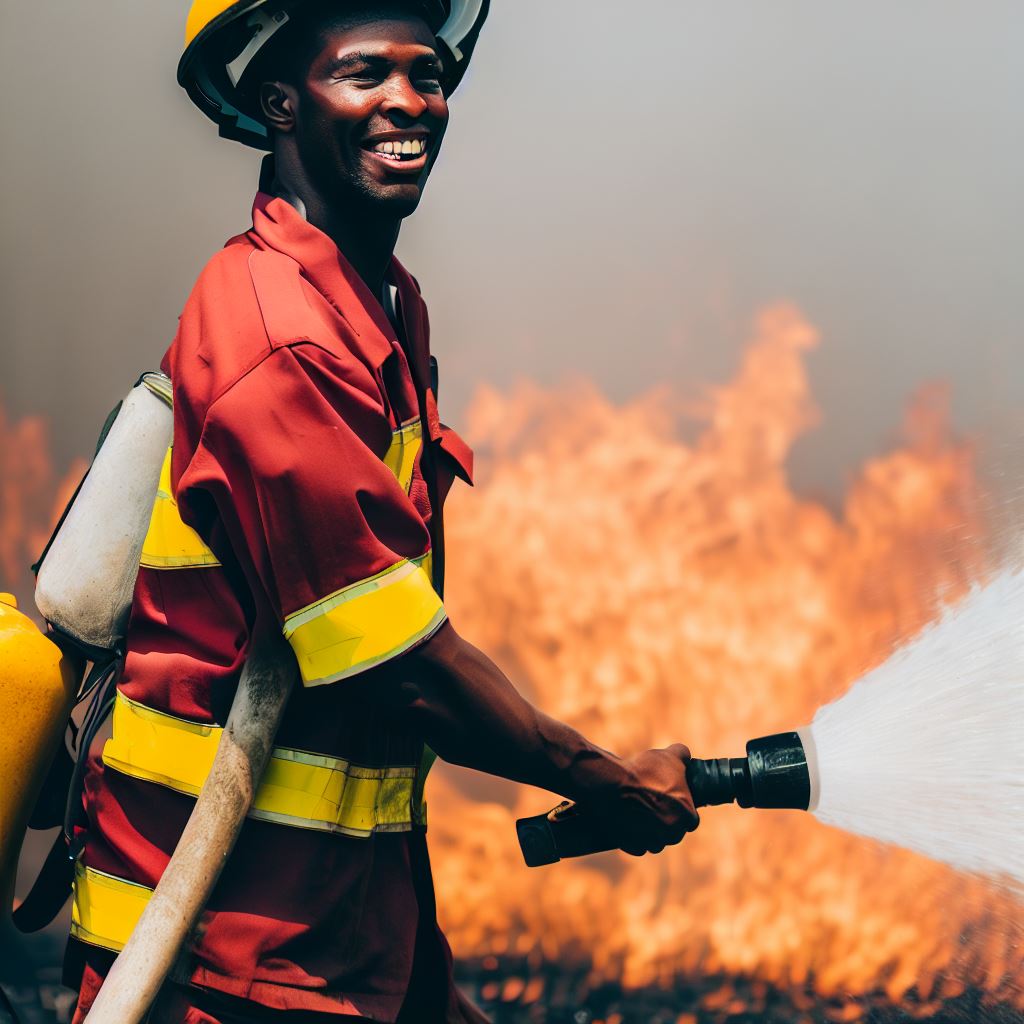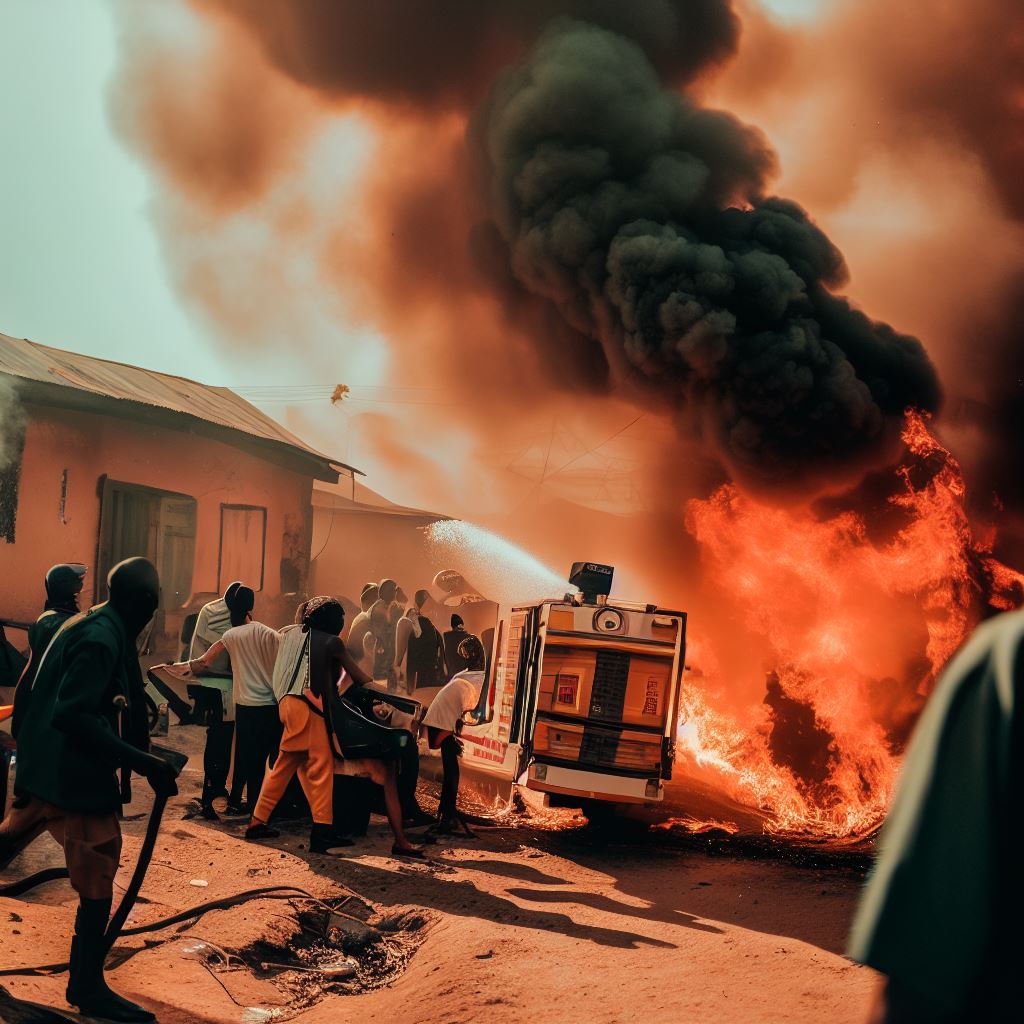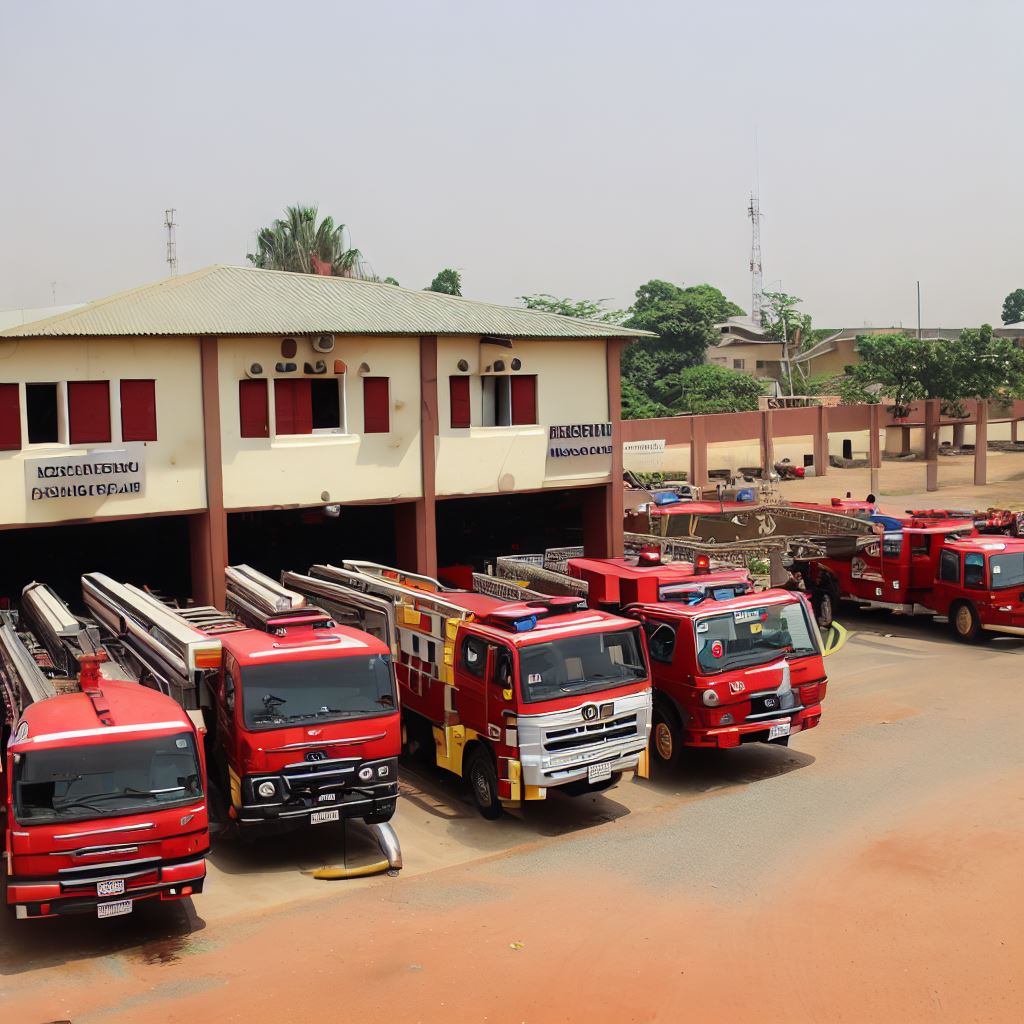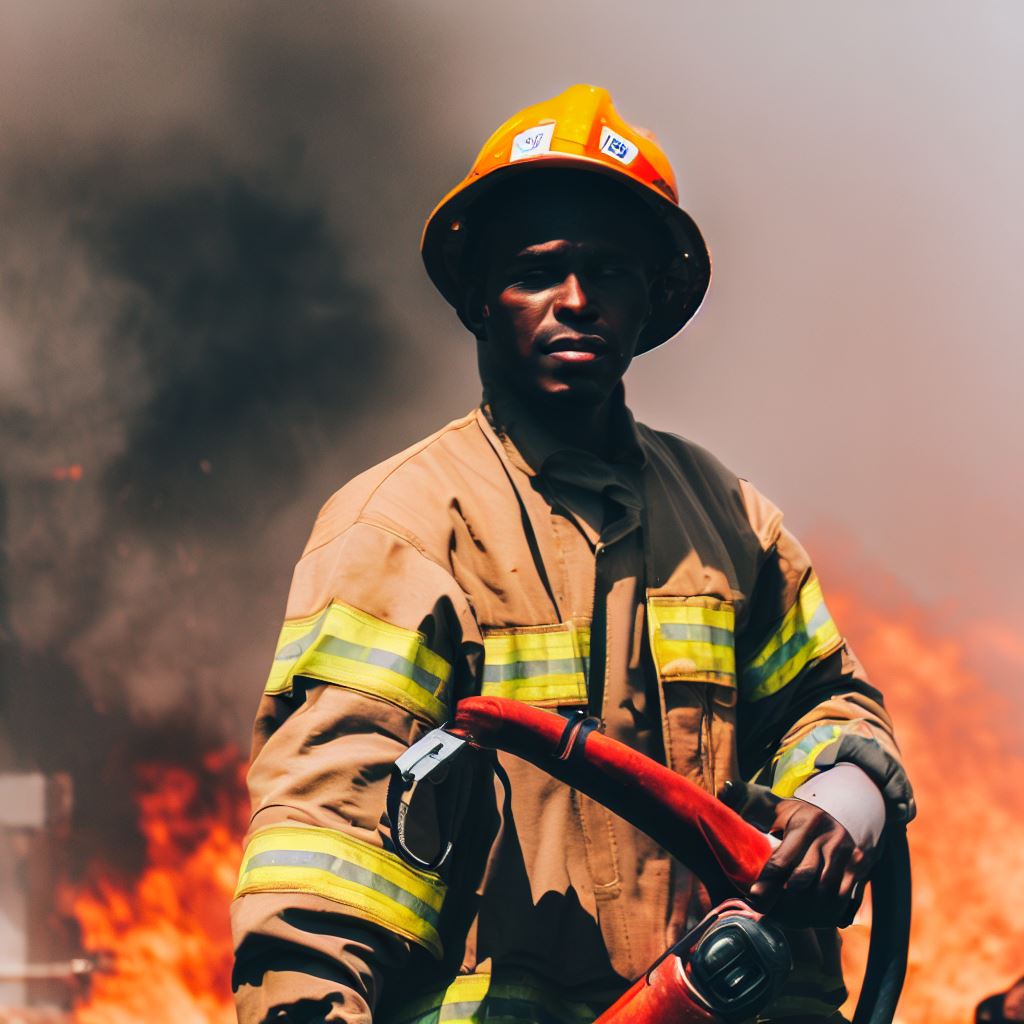Introduction
In the heart of Nigeria, the flames of community protection are fanned by the dedicated efforts of volunteer firefighters.
Their commitment is the cornerstone of public safety and the shield that guards our neighborhoods.
This blog post is your guiding beacon, illuminating the path to becoming a part of this noble endeavor – Volunteer Firefighting in Nigeria.
Imagine standing shoulder to shoulder with local heroes, ready to combat the destructive force of fires.
Volunteer firefighting offers you the chance to make a real difference.
Whether you’re a seasoned firefighter or a newcomer, our mission is to equip you with the knowledge and resources needed to join this lifesaving brigade.
Are you ready to step into the world of Volunteer Firefighting in Nigeria? Let’s explore this journey together.
Understanding Volunteer Firefighting
Volunteer firefighting plays a crucial role in ensuring community safety.
It involves individuals who willingly offer their time and skills to assist in fire emergencies, without expecting any payment in return.
These volunteers are an indispensable asset to the firefighting services in Nigeria.
A. Define Volunteer Firefighting
Volunteer firefighting can be defined as the act of providing fire response services voluntarily, without being professionally trained as a firefighter.
These volunteers are ordinary citizens who possess a passion for helping others and a desire to contribute to their communities’ safety.
B. Importance of Volunteers in Firefighting Services
In Nigeria, where resources for firefighting services are limited, volunteers play a vital role in filling the gaps.
Due to financial constraints and inadequate government funding, the fire departments in many Nigerian communities often lack sufficient personnel and equipment to handle emergencies effectively.
Volunteers act as a vital supplement to the existing firefighting services. Their involvement helps augment the limited resources an understaffed fire department may have.
They assist in response, rescue, and ensuring public safety during fire incidents.
1. Enhanced Emergency Response
By volunteering as firefighters, individuals strengthen the emergency response capabilities within their communities.
They provide additional manpower, allowing for a faster and more efficient response to fire emergencies.
2. Increased Fire Incident Mitigation
Volunteers actively engage in fire prevention and mitigation efforts.
They educate and raise awareness among community members about fire safety measures, such as proper fire extinguisher usage and evacuation procedures.
Their efforts help reduce the frequency and severity of fire incidents.
3. Local Knowledge Advantage
Volunteer firefighters possess in-depth knowledge of their communities.
They are familiar with the geography, infrastructure, and potential risks within their areas of service.
This local knowledge proves invaluable during emergencies, as it aids in navigating and strategizing the firefighting operations effectively.
4. Cost-Effective Solution
Volunteer firefighting is a cost-effective solution for communities with limited resources.
Since volunteers offer their services without financial compensation, it eases the burden on municipal budgets.
By relying on volunteers, communities can allocate their limited funds to other essential services.
5. Community Cohesion and Engagement
Engaging in volunteer firefighting fosters a strong sense of community cohesion.
It brings together individuals from diverse backgrounds, uniting them for a common cause.
By actively participating in firefighting activities, volunteers form close-knit bonds, which results in a tightly-knit and supportive community.
6. Personal Growth and Development
Volunteer firefighting offers individuals an opportunity for personal growth and development.
It allows them to acquire valuable skills, such as first aid, fire safety, teamwork, and leadership.
These skills can be applied in various aspects of life, enhancing personal and professional growth.
7. Selfless Service and Satisfaction
Volunteering as a firefighter provides immense satisfaction through selfless service.
Knowing that one has contributed to saving lives and protecting property instills a sense of fulfillment and pride.
Volunteer firefighters find immense satisfaction in making a difference in their communities.
In review, volunteer firefighting plays a vital role in community safety in Nigeria.
It encompasses individuals who willingly offer their time and skills to assist during fire emergencies.
These volunteers fill the gaps in firefighting services, resulting from limited resources and funding.
Their involvement enhances emergency response, fire incident mitigation, and brings about a sense of community cohesion.
Volunteer firefighting is a cost-effective solution that provides personal growth and the satisfaction of selfless service.
Requirements and Qualifications
Volunteer firefighting is a noble endeavor that requires specific qualifications and attributes.
In Nigeria, becoming a volunteer firefighter involves meeting certain requirements and qualifications.
These include physical fitness and health standards, age restrictions, and educational background.
To become a volunteer firefighter in Nigeria, individuals must possess certain qualifications.
These qualifications ensure that volunteers are capable of handling the challenges and responsibilities that come with firefighting.
The requirements include physical fitness and health standards that are crucial for the demanding nature of the job.
A. Physical Fitness and Health Requirements
- Prospective volunteer firefighters must be physically fit to carry out firefighting tasks efficiently.
- They should have good cardiovascular endurance, strength, agility, and flexibility to tackle various situations effectively.
- Physical fitness tests may include timed runs, push-ups, sit-ups, and obstacle course challenges.
- Adequate hearing and vision are also essential to assess surroundings and communicate effectively during emergency situations.
B. Age Restrictions
- While there are no explicit age restrictions for becoming a volunteer firefighter in Nigeria, most fire departments prefer individuals who are at least 18 years old.
- Younger individuals can join junior firefighter programs, which provide training and experience until they reach the minimum age requirement.
- The upper age limit may vary depending on the specific fire department or organization.
C. Educational Background
- While formal education is not a strict requirement, a minimum of secondary school education is preferred.
- Basic knowledge of English and mathematics is important for communication and problem-solving.
- However, fire departments also provide training and educational programs to enhance volunteers’ knowledge and skills in firefighting techniques, emergency medical services, and handling equipment.
D. Additional Qualifications
- Some fire departments may require volunteers to possess a valid driving license to operate fire trucks and other emergency vehicles.
- Individuals with previous experience in other emergency services or related fields such as first aid or disaster management may have an advantage.
By meeting these requirements and qualifications, aspiring volunteer firefighters can contribute effectively to firefighting efforts in Nigeria.
These qualifications ensure that volunteers are physically capable, mentally prepared, and equipped with the necessary skills to handle emergency situations.
Note: The information provided above is based on general guidelines and may vary depending on the specific fire department or organization in Nigeria.
It is recommended to contact local fire departments and inquire about their specific requirements and qualifications for becoming a volunteer firefighter.
Read: Challenges and Triumphs: Fire Fighting in Nigeria

Training Programs
Volunteer firefighting is a noble endeavor that requires dedication, bravery, and proper training.
A. Training programs available for aspiring volunteer firefighters
Aspiring individuals can participate in various training programs to acquire the necessary skills and knowledge.
These programs serve as the foundation for becoming a proficient volunteer firefighter.
- Firefighting Basic Training: This program covers essential firefighting techniques, equipment usage, and safety protocols.
- Emergency Medical Services (EMS) Training: As a firefighter, knowledge of basic medical procedures can be crucial during rescue operations.
- Specialized Rescue Training: Specialized training focuses on skills needed for specific scenarios like confined space rescues or water rescues.
- Wildland Firefighting Training: This program is essential for those interested in combating fires in forests or other natural spaces.
- Hazardous Materials (HAZMAT) Training: Firefighters need to understand the risks associated with hazardous materials and how to handle emergencies involving them.
B. Local organizations or firefighting academies offering training opportunities
Local organizations and firefighting academies provide these training opportunities both online and through practical sessions.
They equip aspiring firefighters with the necessary theoretical knowledge and hands-on experience.
Some of these organizations and academies include:
- Lagos State Fire Service: The Lagos State Fire Service offers training courses for aspiring volunteer firefighters.
- Nigerian Fire Academy: This academy is Nigeria’s primary institution for training firefighters, providing comprehensive programs.
- Nigerian Institute of Safety Professionals: The institute offers firefighting training along with other safety-related courses.
- Red Cross Nigeria: Red Cross provides first aid training, which is beneficial for firefighting volunteers.
It is crucial to emphasize the importance of ongoing training and professional development for volunteer firefighters.
Continual training ensures that volunteers stay updated with the latest techniques, equipment, and industry standards.
This ongoing education is vital as firefighting methods evolve and new challenges emerge.
C. Benefits of ongoing training and professional development
- Enhanced Skills: Regular training hones firefighting skills, enabling volunteers to effectively handle emergencies.
- Improved Safety: Updated knowledge enhances personal safety and reduces the risks faced during firefighting operations.
- Efficient Response: Ongoing training enables firefighters to respond more efficiently to various incidents.
- Teamwork and Collaboration: Training sessions provide opportunities for volunteers to foster teamwork and collaborate effectively with fellow firefighters.
- Empathy and Compassion: Continuous development helps volunteers develop the necessary empathy and compassion when dealing with victims.
In general, aspiring volunteer firefighters in Nigeria have access to various training programs provided by local organizations and firefighting academies.
These programs cover essential firefighting techniques, medical procedures, specialized rescues, and more.
Ongoing training and professional development are key for volunteers to stay effective, safe, and updated in their role.
By continuously improving their skills, volunteer firefighters contribute significantly to their communities’ safety and well-being.
Read: Fire Fighter Training: A Guide to Courses in Nigeria
Finding Volunteer Firefighting Opportunities
A. Local fire departments and organizations that accept volunteer firefighters
- Nigerian National Fire Service: The primary firefighting agency in Nigeria that accepts volunteer firefighters.
- State Fire Services: Each state in Nigeria has its own fire department that may accept volunteers.
- Non-governmental Organizations: NGOs like the Nigerian Red Cross Society often have firefighting programs that welcome volunteers.
B. Explaining the Process of Contacting Organizations
- Research: Gather contact information for the fire departments and organizations you are interested in volunteering for.
- Phone Calls: Call the fire departments or organizations to inquire about volunteer opportunities and express your interest.
- Emails: Send formal emails to the respective organizations, stating your interest in volunteering and asking for further information.
C. Tips on Building Relationships with local firefighters and authorities
- Attend Open Houses and Events: Visit local fire departments during open house events to meet firefighters and authorities.
- Training Programs: Enroll in firefighting training programs organized by the fire departments to establish connections.
- Community Involvement: Participate in community events and initiatives supported by local firefighters and authorities.
- Volunteer at Fire Prevention Campaigns: Help out during fire prevention campaigns organized by fire departments to interact with firefighters.
Volunteering as a firefighter in Nigeria offers a truly rewarding experience. It’s about more than just fighting fires; it’s about making a positive impact on your community.
Start by reaching out to the Nigerian National Fire Service, where your dedication can help enhance fire prevention and control efforts.
Additionally, explore local fire departments in your state, as many welcome volunteer firefighters.
A simple phone call or a formal email expressing your interest can open doors.
Consider NGOs like the Nigerian Red Cross Society, which collaborate closely with communities and fire departments to bolster safety. Research and get involved.
Building relationships with local firefighters is key. Attend their events, enroll in training programs, and participate in community initiatives.
Your commitment, both physically and mentally, will contribute to the well-being of your community, making your volunteer journey truly fulfilling.
Read: Nigeria’s Fire Fighting: A Day in the Life of a Hero
Challenges and Rewards of Volunteer Firefighting in Nigeria
Volunteer firefighting in Nigeria comes with its fair share of challenges, but the rewards and personal growth experienced through this noble act are unparalleled.
In this section, we will discuss the challenges faced by volunteer firefighters in Nigeria, highlight the rewards and personal growth, and share inspiring stories of how these individuals are making a difference in their communities.
A. Challenges Faced by Volunteer Firefighters
- Lack of Adequate Training: Volunteer firefighters often lack proper training due to limited resources and funding.
- Inadequate Equipment and Resources: Firefighting equipment and resources are scarce, making it challenging for volunteers to effectively combat fires.
- Poor Infrastructure: In many Nigerian communities, the lack of reliable infrastructure hampers access to fire incidents.
- Dangerous Conditions: Volunteer firefighters face risky and hazardous conditions without the necessary safety measures and gear.
- Limited Support: These volunteers often lack sufficient support from the government and are left to rely on community contributions.
B. Rewards and Personal Growth in Volunteer Firefighting
Despite the challenges, volunteer firefighting offers numerous rewards and incredible personal growth:
- Skills Development: Volunteers gain valuable firefighting and life-saving skills through hands-on experience.
- Community Engagement: Volunteer firefighters build stronger connections within their communities and become trusted individuals.
- Sense of Purpose: The opportunity to make a tangible difference in people’s lives and protect their communities provides a deep sense of purpose.
- Leadership Opportunities: Volunteer firefighting often leads to leadership roles and inculcates strong leadership traits.
- Professional Advancement: Experience as a volunteer firefighter can open doors to professional firefighting career paths.
C. Inspiring Stories of Volunteer Firefighters
Let’s explore some inspiring stories of volunteer firefighters in Nigeria who have made significant contributions to their communities:
- Akin, a volunteer firefighter, saved a family of five from a blazing inferno with his quick thinking and bravery.
- Nneka established a volunteer firefighting unit in her community, providing fire safety education and prompt response.
- Tunde managed to rally the support of local businesses, securing funding for fire trucks and equipment in his town.
- Chinwe organized training sessions for fellow volunteer firefighters, empowering them with essential skills and knowledge.
- Kingsley risked his life to rescue a trapped child from a burning building, demonstrating unwavering dedication.
These stories highlight the selflessness and commitment of volunteer firefighters who go above and beyond to protect lives and property.
In fact, volunteer firefighting in Nigeria poses various challenges, from limited training and resources to dangerous conditions.
However, the rewards and personal growth experienced through this noble act are immeasurable.
Volunteer firefighters not only acquire valuable skills but also become integral members of their communities.
Their inspiring stories serve as a testament to the positive impact made by these brave individuals.
Read: Workshops & Events: Coating Tech Education in Nigeria
Uncover the Details: Cleaning Supplies: What Every Nigerian Janitor Needs
Safety and Equipment
Volunteer firefighting in Nigeria embodies both valor and preparedness. In this challenging yet rewarding endeavor, safety reigns supreme.
Safety protocols stand as guardians, safeguarding the brave souls who rush into the heart of danger to protect lives and property.
Publish Your Professional Profile, Business or Brand
Showcase your expertise, gain trust, and boost visibility instantly on Professions.ng.
Publish NowThese protocols are the bedrock of firefighting safety, encompassing the proper handling of equipment, effective communication, and evacuation procedures.
Embracing them is non-negotiable for volunteer firefighters, ensuring their well-being as they tackle blazes.
Personal protective gear stands as the frontline defense against flames and hazards. Fire-resistant suits, helmets, goggles, gloves, and boots are their trusted companions.
These warriors also wield an arsenal of firefighting tools: hoses, axes, thermal imaging cameras, and more. Training to master these tools is paramount.
In Nigeria, limited resources challenge these volunteers. Collaborative support is key, be it from government, private entities, or the community.
By fostering a culture of safety, volunteer firefighters stand united in their noble mission to protect and serve. Together, they become the heroes Nigeria needs.
Conclusion
Getting involved in volunteer firefighting in Nigeria is a noble and impactful endeavor.
The steps to get involved include researching local fire departments, completing the necessary training and certifications, and actively participating in drills and emergency response efforts.
Volunteer firefighters play a vital role in ensuring community safety, as they are often the first responders in times of emergencies.
Their dedication, bravery, and selflessness are admirable qualities that make a significant difference in people’s lives.
If you are passionate about serving your community and making a positive impact, I encourage you to take the necessary steps in becoming a volunteer firefighter.
Your contribution will not only save lives but will also inspire others to get involved and make a difference in their community.




